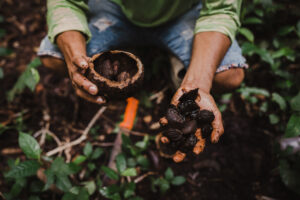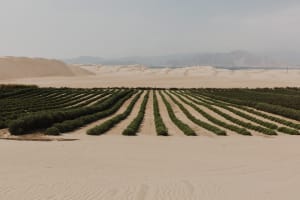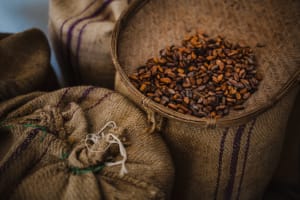At Lush we pride ourselves on our creativity, and this doesn’t stop with our products. Since the beginning our aim has been to use the best, safest and most beautiful ingredients.
We have discovered that if you want the best ingredients, you have to go out and find them yourself in the wider world. Our dedicated Buying team works tirelessly to ensure that’s what we get. Often this involves a great deal of creative thinking and finding solutions to problems, such as sourcing the finest essential oils and absolutes, the best natural raw materials, safe synthetics, 100% recycled packaging or removing Palm oil from our products. Lush has a very strong commitment to the communities and areas from which we buy our ingredients.
We feel that our ingredients should be bought in a respectful way safeguarding the environment and the social impact. Lush supports Fair Trade and Community Trade initiatives. We find out what impact our buying has on the people and environment and make responsible decisions regarding from where, from whom and how we purchase ingredients and packaging for Lush.
- Workers rights – unions, collective bargaining, health and safety, freedom to leave, fair pay, working hours, discrimination, no child labour.
- Environment – organic, sustainability, endangered species, production emissions onto land and water, use of resources to process ingredients, no Genetic Modification…
- Animal protection – No animal testing of ingredients. Vegetarian ingredients only.
- Transport – The distance ingredients travel, minimum air freight, packaging materials used.
For many years we have had a policy of aiming to purchase our materials direct from producers: the farmers, growers and processors, wherever possible, in order to learn the true story of each ingredient. This means that our buying team travel the world visiting suppliers, to meet the people involved. We see first hand how the ingredient is grown, harvested, mined, processed, etc. This allows us to get a better understanding of the raw materials, where they come from, how they are produced, what potential labour or environmental issues might arise and what might impact the cost of the materials (seasonality, crops, climate, etc).
Purchasing our materials in this way, with face-to-face communication also helps us foster good, honest, long-term productive relationships with the producers/suppliers and guarantees uninterrupted supply of good quality materials to make our products. We are able to ensure our suppliers understand the needs of our business and we also understand the constraints of their operations.
Through buying direct from producers we are also able to support and help finance some really worthwhile and forward-thinking projects worldwide that make us proud.
When the Buying Team are not travelling the world and working out in the field, they provide regular updates, reports and presentations of information on:
- The sources of raw materials that we buy to make our products
- Fair Trade and community trade projects
- Suppliers lists
- The status of ingredients
- Sharing their experiences on buying trips (often very challenging!)
- This is constantly evolving as the Lush business grows and we nurture more relationships with suppliers all over the world.
Our stance on child labour is aligned with the ILO standards. We believe the minimum working age should not be lower than the age for completing compulsory education locally. We insist that our suppliers do not engage in any employment of child labour. Should suppliers become aware of any child labour taking place, we would expect them to engage in supporting a training and transition programme to support the child back into education.
most of our flower based essential oils are processed within 2 hours of being picked
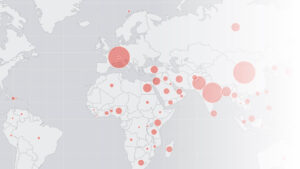
Lush Buying Map
Want the full lowdown on Lush ingredients? Look no further, click on a map point and see what ingredient we source, from where!
recycled plastic packaging since 2008
Lemons freshly squeezed in 2020, in the UK
of our fruit and vegetables are organic
ingredients sourced direct from suppliers
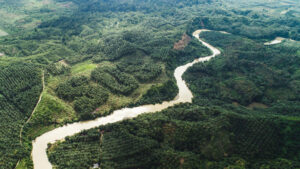
Our impact: Palm
We’re committed to eradicating all traces of palm oil from our supply chain. With more palm-free materials on the horizon, we’re making steady progress…
Further reading
We believe that the way we source materials has an ability to Protect, Regenerate and Restore our planet and communities. Beyond long-term targets and goals, these times call for a much more fundamental commitment from us all. In Buying, we have a commitment to life, in support of diversity and growth of life on our living planet, of rewilding life with humans at the heart of this transformation. Our vision is for a supply network where the regeneration of life is at the core of sourcing decisions. We want to give back more than we take and leave the world a lusher place than we found it.
Our range of wildly harvested materials help to protect over 1.2 million hectares of forest. Purchasing non timber forest based products is an important part of keeping forests standing, supporting alternative livelihoods to logging.
Follow our Biodiversity Trail to see how some of our sourcing projects are protecting endangered and endemic wildlife across the world.
Many of our materials come from regenerative farming methods that are kinder to nature. Our top 12 keystone projects which include cocoa, cotton, coconut, ylang ylang and patchouli oil, makes up over 280 hectares of land.
72% of the plant based materials we use are perennial. Perennial farming is better for soil life and wildlife.
Cotton is extremely water intensive, by using organic cotton we use 91% less blue water in the production of our knotwraps, swag and tote bags.
Our salt is sourced from many different salt pans around the world, covering 23 hectares of habitat for many migratory birds.
We have been able to sequester around 68,000 tons of CO2 each year through the protection and restoration of forests in Peru, Sumatra and Portugal.
We purchase our organic ethanol from Brazil, where our suppliers have introduced biodiversity islands to attract wildlife back onto the land. A survey concluded that the sugar cane plantation is 300 times more biodiverse than a conventional sugar cane plantation.
Sourcing Hub Map
Have a look at some of the projects that have been developed from the Sourcing Hubs.
Sourcing Hubs
In 2017 we decided a strategy was needed, within our work, to protect what is left of the world’s biodiversity. It so happens that the majority of resources we rely on often originate from biodiversity hotspots around the world – where you’ll find the world’s richest soils. We decided to focus on four geographical areas of the world.
South America was one ‘hub’. As one of the richest biodiversity hotspots, home to many endemic species of fauna and flora, it is all the more important that we have a hands on approach to ensuring our purchasing practices supports biodiversity, not endangers it. Agriculture is the biggest cause of habitat loss and ecosystem fragmentation. It was therefore vital that we adopt alternative agricultural/ harvesting practices which challenges more destructive agricultural approaches.
A Lush Sourcing Hub (sometimes an entity, or on-the-ground team) holds the space to directly support local communities and businesses who produce materials in ecologically and socially just ways, through the purchase of materials. This may involve working in more unconventional ways to help communities set-up and scale up to supply the volume and quality of material needed. It may also involve setting up demonstration farms/ forestry in order to influence and support alternative, more ecological ways of producing materials.
Meet the team!
What do you love the most about your role?
“It is rare that you will work in a Buying role and be able to feel as an individual that you are able to positively impact the world. At Lush, their ethics run though the whole of the business and are at the forefront of what we do in Buying. As a raw materials Buyer, my remit is hugely varied. Although there is so much to learn, I get to work with such a wide variety of suppliers located all over the world, who each specialise in different areas.”
Abi Whisken – Raw Materials Buyer
“I love the dynamic. Nothing is ever the same at Lush. The unsureness of what’s around the corner makes this job really exciting. I have three completely different categories to look after and it can be challenging at times. However, as a result of this, I’m able to develop myself within all sorts of areas.”
Karolina Michalska – Print, Packaging and Store Design.

Fragrant Harvest Calendar
Ever wonder why we smell so good? Have a look at what’s being harvested and turned into fragrance right now
Fragrant Harvest Calendar
The Buying team exists to bring your Lush products the freshest, best quality materials we can find. This often takes us to all corners of the world – mountains, deserts, forests and coastlands. We often rely on specific microclimates, soil microbiology and ecosystems for our diverse range of essential oils and absolutes. In most cases our essential oil crops need to be distilled within a couple of hours of being picked, to ensure the oils don’t evaporate. That’s how fresh we are!
We work with our trusted suppliers to ensure we understand each step of the process to bring the best quality oils out of nature’s offerings.
Have a look at what is being harvested around the world, right now, ready to be distilled or extracted into oils and absolutes for your beautiful Lush product.
Buying Innovation
Innovation has always been the heart of Lush. In Buying, we have also had to rely on creativity to be able to develop new packaging and shop fittings which are more regenerative. Here are a few examples:
Yoghurt pot surfaces: Some of our shops have incorporated a 100% recycled yoghurt pot board into their design. This off white material is easily recognisable by the scraps of silver left from the yoghurt pot lids during recycling!
Skincare “slates” : They look like slate but they are actually made from 100% recycled plastic from our soap moulds. By doing this we have closed the loop on our waste stream and we think they look great too!
Ceramic tiles: Did you know when you are walking around our shops the tiles you are standing on are made from between 21-45% recycled content and produced solely using green energy.
For the packaging we do use, 84% is reusable, recyclable or compostable and 72% is made from recycled, organic or regenerative sources. Our digital fulfilment boxes are also now being sourced from a carbon neutral company in the UK, drastically reducing the footprint of more than 637,000 boxes we send across Europe.
of Lush packaging is reusable, recyclable or compostable
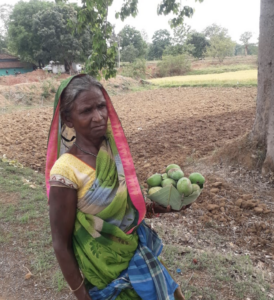
Women empowerment
Our organic and Fair For Life certified mango butter is sourced from Manorama Industries in Chhattisgarh, India. Manorama Industries work with local women’s cooperatives who hand-collect the mangoes from the forest floor, hand-peel the flesh and crack the seeds. They also give the cooperatives training on harvesting methods, helping protect India’s mango trees while providing a sustainable source of income. India is one of the world’s largest mango producing countries and the potential availability of mango kernels is around 500,000 tonnes, which can yield about 40,000 tonnes of mango kernel fat. Manorama pioneered the use of seeds extracted from the fruits lying on the forest floor, which otherwise would have become forest waste.
Women empowerment
Gender equity and empowerment is a non-negotiable goal, and an integral intent in its own right. Aside from this, Project Drawdown calculates that investing in the health, wellbeing and education of women and girls, and allowing women to make their own choices about their own education and bodies, can lead to a saving or sequestering of over 85 gigatons of CO2 equivalent.
Through supply chain partnerships and through charitable giving, Lush connects with a number of fantastic organisations around the world who work to uplift, support and empower women and girls, especially in the majority world.
These partnerships include:
12:11




